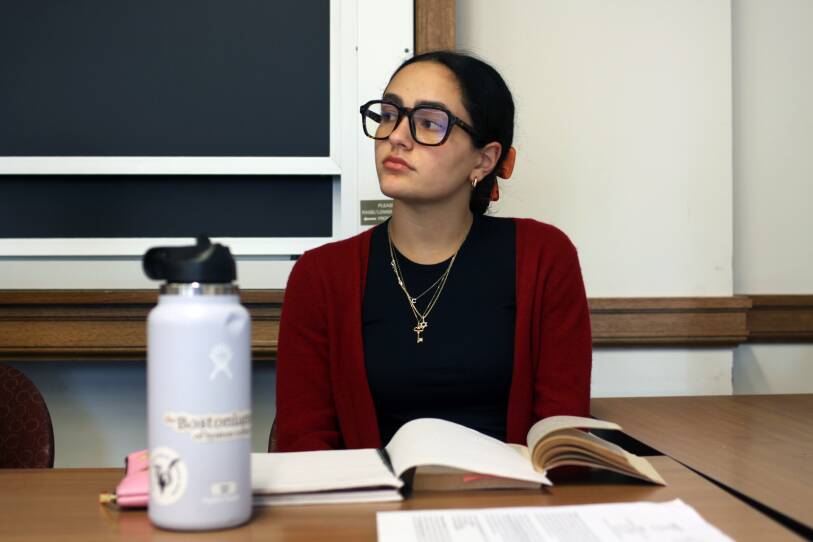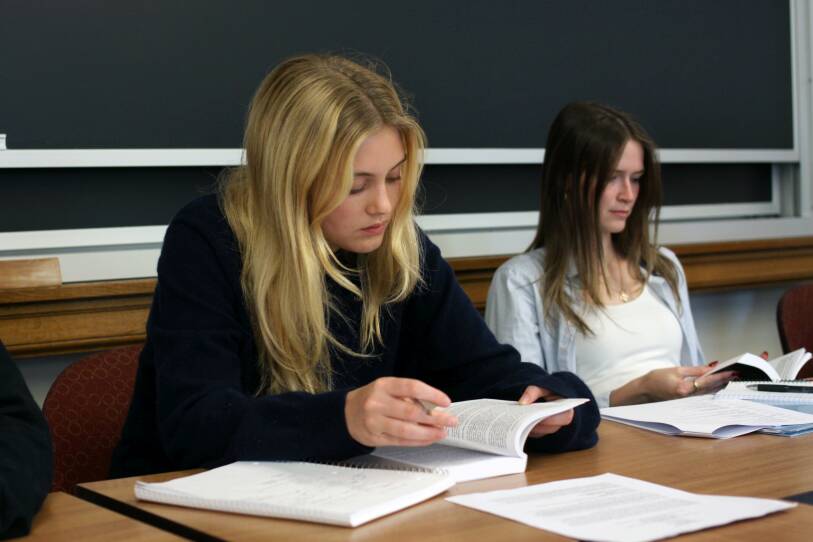Moments before class begins in Carlo Rotella’s English course at Boston College, students quietly tuck away their cellphones and laptops. For the next 75 minutes, time seems to slow down.
Together, they discuss the assigned book, “The Rise of Silas Lapham,” a 19th-century novel based in Boston about ambition and social mobility. Rotella, gripping a stick of chalk in one hand and his well-thumbed paperback copy in the other, sketches a map of the city on the board.
He taps the chalk to grab his students’ attention.
“Who you are in this novel is often where you are — and when,” Rotella points out, urging his students to participate in the discussion. “What did you mark? What showed up in that first chapter?”
No one is allowed to sit in silence; Rotella insists every student speak up early and often.
“There’s an unwritten rule that if you don’t speak in the first two weeks of a semester, you’re just not gonna speak in that class after that,” he explained, sitting in his office before class. “So I make it a requirement.”

These days, that requirement feels urgent. Families are questioning the value of a liberal arts education. Sleek digital tools like ChatGPT that can summarize readings or spit out essays in seconds are sweeping across campuses, forcing faculty to rethink what — and how — they teach.
Nationwide, skepticism about the return on investment in college is growing. A new Gallup poll finds only 35% of Americans now see a college degree as “very important,” down from 75% 15 years ago.
Some professors are embracing AI as a teaching partner.
But others, like Rotella, are pushing back, instead doubling down on digital-free, discussion-based classes. In his new book, “What Can I Get Out of This?,” he argues that unplugged classrooms are a kind of training ground for citizenship.
“I think you should encounter people in your education who show you how to use AI and other technologies,” he said. “But if you want to get stronger and faster, you need to move the weight yourself and you need to run the distance yourself.”
This semester, for the first time this century, Rotella is giving in-class exams. And he’s not alone. Blue Books, those iconic booklets for test-taking, are making a comeback.
Rotella says his students, who often “ace adolescence” just to get into a place like Boston College, have long seen the deliverables — like papers and tests — as the main event. But they’re not.
“The 2,000 minutes we spend together in class in a semester, that’s the main event,” he said.
Some of his students who were skeptical at first now admit the low-tech format works.

“It’s really different because in a lot of classes, you’re just sitting and listening,” said senior Samantha Hoyer, a political science major from Atlanta. “The pressure is kind of on us to talk and to notice things.”
Luke Murray, a senior biochemistry major from Philadelphia, has discovered he actually enjoys analyzing literature in small groups. “I don’t want that part of college to fall by the wayside,” he said.
Others see a broader shift with AI creeping into nearly every corner of campus life.
“There are far fewer essays, way more in-class exams, and none of my classes allow electronics,” said Charlie Elkoff, a senior political science major from New York City. “It’s all handwritten for me right now.”
That may ultimately be a good thing for these developing brains. A new MIT Media Lab study warns overreliance on AI can weaken memory and cognitive development.
“There is no ‘buy-now-pay-later’ that you can use with your brain,” said Nataliya Kosmyna, who co-authored the report “Your Brain on ChatGPT.” “If you’re not actively using your brain, you might be more prone to suggestions of the algorithm, especially if you are a young adult when your brain is not fully developed yet.”
As his class at Boston College wraps up, Rotella compares a good novel to a Lego set dumped on the table.
“And I’m talking about the old kind,” he tells his students. “Not the one where you have to follow the instructions and make a specific Star Wars thing, but the one where you just have Legos and you can make whatever you want.”
In his office, away from the classroom, Rotella reflected on what skill he’s really teaching. He said his students are learning how to think — not what to think.
“It’s equipment for living,” he said. “It’s the same skill you use when you think about the State of the Union Address or the state of your neighborhood.”
And in a discussion-based class, Rotella adds, students are also practicing citizenship itself — speaking up, pulling their weight and making meaning together.








